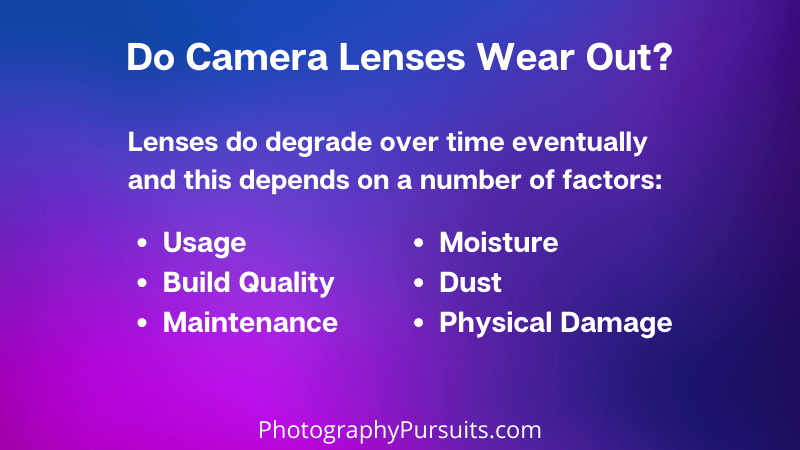💡 While it is hard to pinpoint exactly how long a camera lens lasts, you can easily expect a good quality lens to last you well over 5 years with the right care and maintenance.
Some people report having lenses functioning for over 20 years without problems.
9 times out of 10, your lens will outlast your camera body and investing into good lenses is always recommended if your budget allows it.
As with anything in life, not all lenses are equal and because of this you may find that lenses can vary a lot in terms of their lifespan.
Table of Contents
Do Camera Lenses Wear Out?

Yes camera lenses definitely will degrade and wear out over time if they’re not taken care of.
The main things that can cause a lens to stop working properly are moisture, dust and physical damage.
Luckily, if you store your lenses at home then there are multiple ways to make sure your camera equipment can avoid moisture, dust and physical damage.
But even if you store your lenses perfectly they will eventually wear away over time because a few other factors.
Let’s look at some other things that can affect the lifespan of a camera lens.
What Affects the Lifespan of an Interchangeable Lens?
Build Quality
Not all lenses are equal.
An 18-55mm kit lens is an inexpensive starter lens which is not made to last a lifetime.
They don’t have weather sealing and are made of cheaper plastic components.
Compare this to a more expensive lens such as the Canon EF 70-200mm f/2.8L IS III USM and it’s a completely different ball game.
Not only will the lens be optically better for images, but the durability will be considerably better.
The parts used will be of much higher quality with much better weather resistance under harsh conditions.
The price tag tends to reflect the quality and, in general, the more expensive a lens is, the longer it’s going to last you.
High end lenses are built to last and if you use lenses correctly, you can make them last a considerably long time as long as you store your lenses properly.
Usage
Usage is one of the most important things to consider with the lens’ lifespan.
Shooting portraits in a studio with no humidity or extreme conditions is a world apart from shooting wildlife in the Serengeti.
Clearly, if you took the same lens and gave it to two people who shoot in completely different scenarios, the lenses will last varying amounts of time.
If you regularly shoot in extreme weather like rainforests, snow, storms etc then your lenses will definitely take more of a battering and increase the chance of wear and tear which in turn will chip away at the camera lens’ lifespan quicker.
Luckily, if the lens is a very high quality lens with adequate weather sealing, these lenses can still last an awfully long time.
Maintenance
Lenses are mechanical and made of multiple complex components. So, while they can be made to be very durable they CAN break.
The most obvious thing to consider is accidental damage from dropping your lens or knocking against things as this can damage the lens leading to repair.
For the most part, this can be easily avoided so it shouldn’t be too much of an issue.
Where possible you should limit exposure to dust and moisture.
Of course, if you specifically need to shoot in scenarios where you are up against these conditions then there isn’t much you can do besides having the correct sealing and protective equipment.
There’s always a balance to be had since you don’t want to leave your camera and your lens at home just to keep it safe when you could be getting the shot of a lifetime – even if it does mean putting your lens through some harsh conditions.
Summary
In general, even starter lenses can last you a good few years and potentially up to a decade.
Once you start to grow to more expensive higher quality lenses you should have no problem keeping a lens functioning for a minimum of 5 years with the proper care.
Invest in good glass (lenses) as they will probably outlast your camera bodies.
Related Reading:
